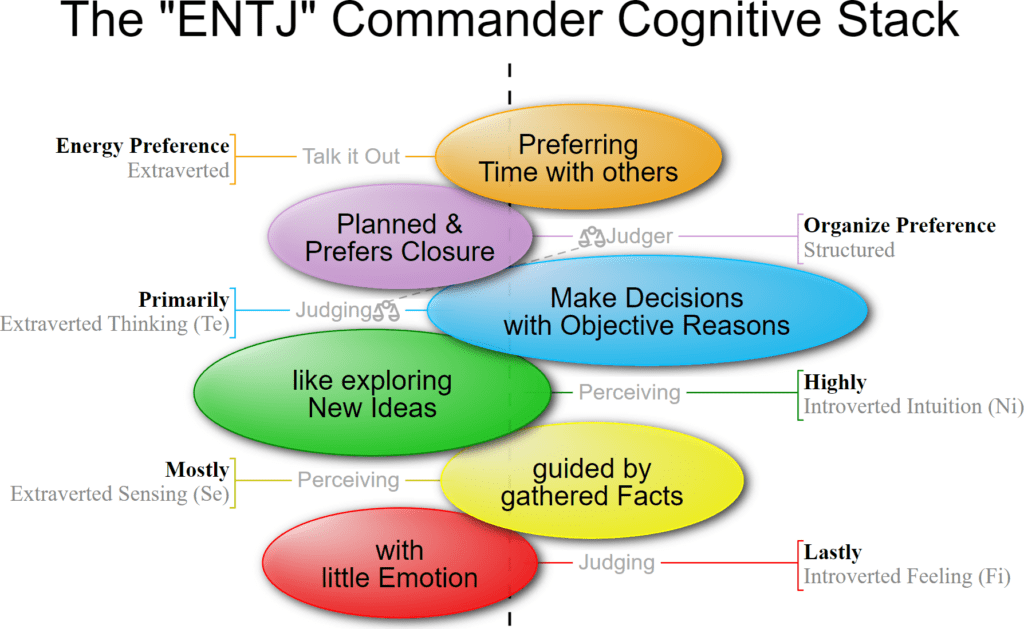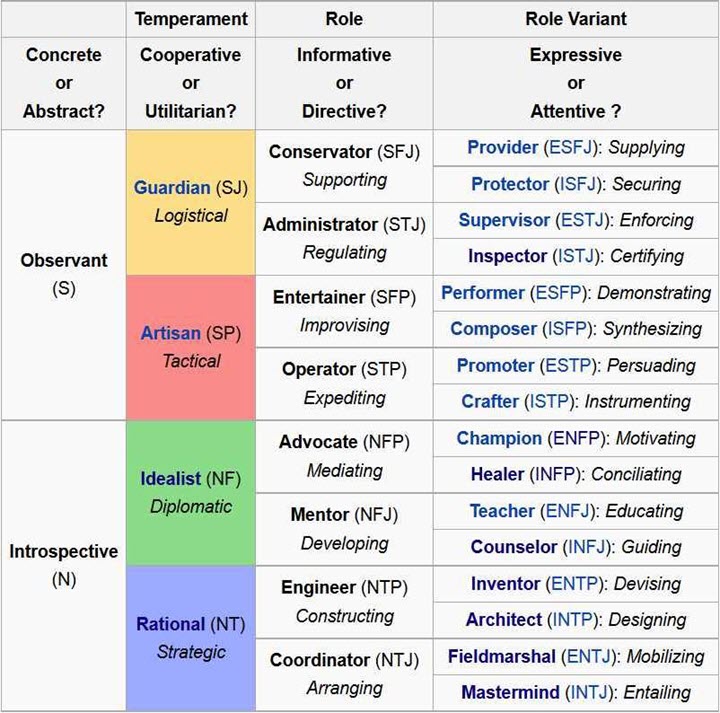What is the Keirsey ENTJ “Fieldmarshal” Personality Type?
The Keirsey ENTJ “Fieldmarshal” Personality Type is a Rational Temperament with an Abstract Communication Style and a Utilitarian Action Style.
Keirsey organized the Four Temperaments as a matrix. There are two communication styles, abstract and Concrete, similar to the Myers-Briggs Intuition (Abstract) and Sensing (Concrete) “Perceiving” Cognitive Functions.
And by two action styles: cooperative and utilitarian. Utilitarian people, for the most part, do what works, while Cooperative people do what’s right.
Keirsey named the Four Temperaments as suggested by Plato: Artisan (Iconic), Guardian (Pistic), Idealist (Noetic), and Rational (Dianoetic).

Concrete versus Abstract Communication Style
Keirsey divided the Four Temperaments into two Communication Styles: Abstract and Concrete. These styles resemble the Myers-Briggs Intuition and Sensing “Perceiving” Cognitive Functions.
Some people talk primarily about everyday reality’s external, concrete world: facts and figures, work and play, home and family, news, sports, and weather—all the who, what, when, where, and how of life.
Other people talk primarily about the internal, abstract world of ideas: theories and conjectures, dreams and philosophies, beliefs and fantasies—all the whys, ifs, and what might be of life.
Concrete people talk about reality daily, while Abstract people talk about ideas.
According to Keirsey, everyone can engage in both observation and introspection. People are observant when they touch objects or otherwise perceive the world through their five senses. When people reflect and focus on their internal world, they are introspective. However, individuals cannot engage in observation and introspection at the same time. The extent to which people are more observant or reflective affects their behavior.
People who are generally observant are more ‘down to earth.’ They are more concrete in their worldview and focus on practical matters such as food, shelter, and their immediate relationships. Carl Jung used the word sensation when describing people who prefer concrete perception.
Generally, reflective people have more ‘heads in the clouds’ and abstract worldviews. They focus on global or theoretical issues such as equality or engineering. Carl Jung used the word intuition to describe people who prefer abstract perception.
Cooperative versus Utilitarian Action Style
Some people act primarily practically or pragmatically; that is, they do what gets results, what achieves their objectives as effectively or efficiently as possible. They only check afterward to see if they observe the rules or go through the proper channels.
Other people act primarily cooperatively or socially acceptable; they try to do the right thing in keeping with agreed-upon social rules, conventions, and codes of conduct. Only later do they concern themselves with the effectiveness of their actions.
These two ways of acting can certainly overlap, but as they lead their lives, utilitarian people mostly do what works, while cooperative people do what’s right.
Keirsey compares the differing temperaments with cooperative (Complying) and pragmatic (Adaptive) temperaments. Cooperative people pay more attention to other people’s opinions and are more concerned with doing the right thing. Sensible people (Utilitarian) pay more attention to their thoughts or feelings and are more concerned with doing what works. No comparable idea in the MBTI or Jung corresponds to this dichotomy, which is a significant difference between Keirsey’s work and Myers and Jung’s.
The pragmatic temperaments are Rational (pragmatic and abstract) and artisan (Pragmatic and concrete). The Cooperative Temperaments are Idealists (Cooperative and Abstract) and Guardians (Cooperative and Concrete). Neither the MBTI nor Jung included the concept of Temperament in their work.
ENTJ Keirsey/MBTI Correlation
| Keirsey | MBTI | |
|---|---|---|
| E | Expressive Role Variant | Extraverted Thinking |
| N | Abstract Communication Style | Introverted iNtuition Auxiliary Function |
| T | Utilitarian Action Style | Extraverted Thinking Dominate Function |
| J | Directive Role | Think is a Judging Function |
The MBTI ENTJ “Commander” Personality Type corresponds to the Keirsey ENTJ “Fieldmarshal” Personality Type, with Introverted Intuition as the second Auxiliary Function and Extraverted Thinking as the first Dominant Function.

ENTJ Personality Type cross-reference
- Keirsey Type – Field Marshal
- Temperament Type – Choleric
- Animal Type – Lion
- DISC Type – Dominant
- Socio-Communicative Type – Driver
- True Colors – Green
- Color Code – Red
- Personality Compass – North
- Occupational Type – Enterprising
- Learning Type – Activist
- Leadership Type – Dominator
Enneagram Types
Fieldmarshal Personality Characteristics
The Fieldmarshal has a strong natural urge to provide structure and direction, to harness people in the field, and to direct them to achieve distant goals.
Hardly more than two percent of the total population, Field Marshals are bound to lead others from an early age and can be observed taking command of groups.
The field marshal resembles Supervisors’ tendency to establish plans for a task, enterprise, or organization, but they search more for policy and goals than regulations and procedures.
When in charge of an organization, whether in the military, business, education, or government, the Fieldmarshal, more than any other type, desires (and generally has the ability) to visualize where the organization is going, and they seem able to communicate that vision to others.
Their organizational and coordinating skills are highly developed, so they will likely be good at systematizing, ordering priorities, generalizing, summarizing, marshaling evidence, and demonstrating their ideas.
However, their ability to organize may be more highly developed than their ability to analyze, and the Fieldmarshal leader may need to turn to an Inventor or Architect for this kind of input.
The Fieldmarshal will usually rise to positions of responsibility and enjoy being executives.
They are tireless in their devotion to their jobs and can easily block out other areas of life for their work’s sake.
Superb administrators in any field—medicine, law, business, education, government, the military—field Marshals organize their units into smooth-functioning systems, planning and keeping both short-term and long-range objectives in mind.
For Fieldmarshal, there must always be a goal-directed reason for doing anything, and people’s feelings usually are not a sufficient reason.
They prefer decisions based on impersonal data, want to work from well-thought-out plans like engineered operations – and expect others to follow suit.
They are intent on reducing bureaucratic red tape, task redundancy, and aimless confusion in the workplace. They will dismiss employees who cannot follow the program and increase efficiency.
Although Fieldmarshals tolerate established procedures, they can and will abandon any system when it is ineffective in accomplishing its goal.
Field marshals root out and reject ineffectiveness and inefficiency and are impatient with the repetition of error.
Famous Field Marshals
Hillary Clinton, Napoleon, Margret Thatcher, Carl Sagan, Bill Gates, Golda Meir, Edward Teller, George Benard Shaw, and General George C. Marshall are examples of Rational Field Marshals.

What are the Keirsy Personality Temerpaments?

David Keirsey, born in 1921, was an American psychologist specializing in conflict management and family counseling. He began researching human behavior and Personality in the 1940s.
Keirsey blended the Myers-Briggs Personality Types with Ernst Kretschmer’s model of the Four Temperaments, developing the Keirsey Temperament Sorter, which was made famous by his book “Please Understand Me.”
Instead of using the term Personality, Keirsey used Temperament. He viewed it as a configuration of observable Personality Traits, communication habits, patterns of action, characteristic attitudes, values, and talents. To Keirsy, Temperament encompasses personal needs, individual contributions, workplace contributions, and societal roles.
Keirsey correlated the sixteen MBTI Personality Types into Four Temperaments. He divided each Temperament into two Roles: informative and Directive. He subdivided the roles into expressive (extraverted) and attentive (introverted) role Variables.
Informative versus Directive Roles
Keirsey distinguishes between people who generally communicate by informing others versus those who speak by directing others. This distinction subdivides each of the four Temperaments into eight Roles.
Expressive versus Attentive Role Variants
Individuals who act before observing are Expressive. In contrast, people who follow before working are Attentive.
Expressive and attentive variants further subdivide the eight roles into 16 types correlating to the 16 Myers-Briggs personality types.


